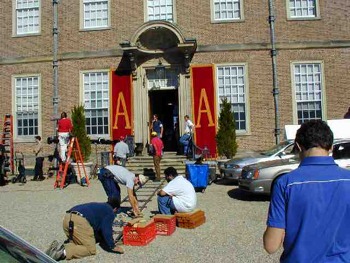
Making of ‘The Perfect Gooseys’
Written by Amy Souza | Posted by: Anonymous
After a successful run with his Sundance short film hit "Chicken Pox Pal," Andrew Mudge is hard at work on his latest film "The Perfect Gooseys." Shot in the Boston area, the film is currently in post-production and is expected to premiere in Spring 2002.
AS: Tell me about "The Perfect Gooseys."
Mudge: It’s a short, 15 minutes, shot on 35mm in Ipswich and Fairhaven. It’s about the experiences of an unpopular kid, his hellish experiences at a prep school. It’s really magic realism, fantasy. It takes place at Auburn Academy [a fictional prep school] where every car has a billboard on the roof, you know like "My child is an honor student at Auburn Academy." We got 60 expensive cars and they all had neat, white billboards, 3 feet by 2 feet, on top of the cars proclaiming the achievement of their kid. The one kid whose dad drives an ‘83 old beat-up station wagon — this dad is trying to figure out something for his kid to do. So it’s sort of this kid’s fever dream of his experience at this school. In the end, the Dad comes up with something that defies, in a unique way, everyone there. But I don’t want to give it away.
Also, the kids have to earn Auburn Academy achievement sweaters. When you don’t have an achievement sweater you have to wear a green sweater. By the end of the movie, everyone has an achievement sweater except for George Goosey, the main character. He’s just a normal kid surrounded by overachievers. And his Dad’s the school janitor, that’s why he can go to school there. It’s a comedy, obviously, and a magic realism fairy tale.
AS: When did this all begin?
Mudge: Well, I started the ball rolling in May. Maria Arruda signed on in July, so June I was basically on my own. In June I went to a record-breaking number of locations, I don’t think any other director has been to as many locations as I did. I wanted a perfect exterior of a prep school — gothic, big, one that just said ‘Money.’ I went to something like 70 locations. I wanted to keep it within an hour of Boston, but I basically spent the summer driving around New England.
Every prep school rejected me in the end. Because of the story. It’s true; the whole movie totally makes fun of prep schools. I probably shouldn’t have wasted my time on them. I guarantee I went to every prep school. I wrote letters, had meetings.
Tim Graft at the film office gave me the idea of shooting at an estate and he recommended Crane’s estate. It was absolutely the best location and it had the biggest price tag. We shot there for 5 days, all the exterior shots. Then we shot at the old Fairhaven High School. We shot in the old classrooms.
I really learned for the first time the continual struggle of an independent filmmaker. Your money is so limited. You’re constantly up against the decision. There are two roads. One is cheaper but the road that’s more expensive is ultimately going to make a better movie. As it turns out, we spent all our money on the production and now have to raise money for post-production. We sent out a lot of letters to friends and family, like a lot. Basically, I’m giving away everything on the film. The billboards, they’re nice. They cost like $40 apiece. We’re giving them away to people who donate a certain amount of money. The sweaters, too. And people who donate can come to the screening for free.
AS: How was it to shoot this film?
Mudge: It was hilarious. It was a big team of people. We had people who worked for free. We had scenes with 150 kids in the audience, lots of extras. We had 60 luxury vehicles for 4 days. It’s amazing when you make a movie, the miracles just happen. Without that magic, this film never would have happened.
AS: Who plays George Goosey?
Mudge: Dan Berardi from Georgetown, Massachusetts. Kevin Fennessy (the casting director) brought in so many kids. Dan just had a great look about him. He looked like a kid who could have been picked on all of his life, like George Goosey.
Bob Jordan plays the father. He’s in his mid-60s but looks like he’s 90. I saw him in a film festival and I knew I wanted him to play the father.
Will Lyman plays the headmaster of Auburn Academy. He’s just an incredible actor, working between New York and Boston.
I think it’s a great cast. Right now we’re just trying o raise funds to do the editing. The goal is to have an opening in the spring.
AS: How is it directing kids?
Mudge: So many of my movies have had kids. They totally keep me young. It’s fun. Sometimes I feel sad, though, because I’m working them so hard. Also, you’re not only dealing with the kids you’re dealing with their parents.
AS: How much film did you shoot?
Mudge: Um, let me think about that. About an hour and a half, an hour and 20 minutes. When you’re doing the budget you’re trying to figure out the shooting ratio. And when you get to the set and you have all those kids you think, ‘I’ve built too much to risk losing it in the lab.’
I got a grant from Kodak; they gave me for free half the film. I won it at a film festival for Chicken Pox Pal.
AS: When we last spoke you were about to write a feature-length screenplay.
Mudge: I did write a feature-length screenplay. But I really felt like the biggest thing I had done was Chicken Pox Pal. I really wanted a 35mm experience. And The Perfect Gooseys couldn’t have been a bigger experience. The crew it takes to man that type of production is bigger than I’m used to. But everyone’s making movies these days and you’ve got to make yours look and be the best that it can. So I said to myself, ‘I’m going to make a 15-minute movie and those 15 minutes are going to be a chunk out of the best movie I could make. I just spent a lot of time on every detail. And I’ve learned so much. Each film I’ve made, I look back and say, ‘I knew shit before.’ And that’s a good thing. Maybe I’m afraid of failing on a feature and if I train myself enough that won’t happen.
When I look at the footage now I get really excited — and it takes a lot to get me excited. If this doesn’t open a door I’m going to go live in the woods and become a logger.
AS: Do you think you will stay in Boston?
Mudge: This movie was such a huge commitment for me, an investment in myself that I’ve got do whatever I’ve got to do to propel this career forward. But I have a bunch of stories and they all take place in New England. Whether I’m living here or not sort of depends on who’s making the movie. One thing that’s for sure is that I can’t produce a feature.
Talking with Producer Maria Arruda
AS: How did you get involved with this film?
Arruda: I met Andrew at the Woods Hole Film Festival at a screening of "Chicken Pox Pal." I just loved it, thought it was hilarious. We became friends and have remained friends. He was working on the Perfect Gooseys and realized he needed someone to produce it. I came on in July and have been working on it ever since.
AS: What was your role in the film?
Arruda: We all kind of pitched in where we had to. But mostly I did the producing. In pre-production I spent a lot of time finding equipment companies. During production I did the production management during shooting and the coordination. Now in post I’m putting the producer hat back on and trying to raise funds.
AS: How was the fundraising?
Arruda: It was an experience. We received quite a response. It was a great first experience in fundraising. We thought September 11th might affect it, but maybe it actually hit a chord with people and made them want to encourage the arts, I don’t know.
AS: Tell me how you got permission to shoot at Fairhaven High School.
Arruda: We had to go in front of the school board. It was 8 guys and the superintendent of schools. I was really nervous for it. [Arruda grew up in Fairhaven and went to Fairhaven High.] It was a big deal; it was taped and shown on community TV. A reporter from the Standard Times was there. I was nervous. Andrew and I had been so busy that we didn’t have time to write anything, so as we were driving to Fairhaven I was sitting there writing what I was going to say and Andrew’s on the phone with a ton of kids trying to get casting done.
AS: Did you give them a script?
Arruda: No, we gave them a synopsis. I had spoken to the principal and he said there was a possible problem with the content of the story. He didn’t want FHS established as a private school that breeds these types of kids. But I think it helped that I was an alum and that we were going to use kids from the area as extras.
AS: What was the most difficult part of making the film for you?
Arruda: I think it was making up for the lack of experience in production. I was constantly trying to gather information and advice and figure out what was best for the film, trying to practice good judgment skills. Things like dealing with rates for crew members, like what’s a fair rate, when I had nothing to compare it to. And negotiating with equipment companies. But, really, this was just an amazing learning experience.
AS: Why did you choose to work with Andrew?
Arruda: He has a great vision for films. He’s very creative and precise. He’s extremely detail oriented, down to the tiniest detail. It’s wonderful working with someone who’s so decisive. He’s also a gifted, talented individual. Seeing "Chicken Pox Pal," I really believed in his abilities. I like what he’s doing for film. And he has a really good sense of comedy.
AS: What drew you to film as a medium?
Arruda: Growing up, I loved movies. We never had cable so we were forced to watch movies for entertainment. I never knew you could have a career in it. Where I grew up, I just thought of careers in like nursing or business. It never crossed my mind that you could have a career in the arts. I moved to Los Angeles when I was 19 and I worked in insurance. I met a lot of people in the industry and I realized, "Wow, you can actually make a living at this." That’s where the passion spawned. I took some classes in LA. I’ve always wanted to make really good stories for an audience, to make people forget about their lives for two hours, to provide that escape. And my parents have always been supportive. They just think it’s unique and great.
AS: Tell me about the crew.
Arruda: We had some really great people, exceptional people. I have to mention Nicole Ritchay, our associate producer. She did all the extras casting. Got 100 kids in uniform, behaving perfectly. She got us 50 luxury vehicles. She was just phenomenal. And she did it alone. T.R. Boyce was our 1st AD. He was unbelievable. He was really able to get us all the shots we needed. We moved really quickly. Justin Shervatt was our 2nd AD who came on in September. He helped us with all of the production details and now he’s off at the London Film School making short films. Ed Slattery was our cinematographer and the film just looks beautiful. We had such an amazing team. I could go on and on about them. I’m really proud of the outcome.











